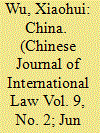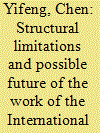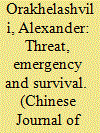|
|
|
Sort Order |
|
|
|
Items / Page
|
|
|
|
|
|
|
| Srl | Item |
| 1 |
ID:
097082


|
|
|
|
|
| Publication |
2010.
|
| Summary/Abstract |
The report of the Appellate Body of the WTO Dispute Settlement Body in China - Publications touches new ground by ruling on a few key legal issues. Its significance and ramifications go well beyond the present case and may influence subsequent WTO jurisprudence relating to the distinction between goods and services, trading rights commitments and availability of General Agreement on Tariffs and Trade (GATT) Article XX defense, etc. Nevertheless, the Appellate Body report has its shortcomings, especially in relation to what the author views to be a flawed interpretation of GATT Article XX(a). This paper argues for the Appellate Body abandoning the present interpretive approach in favour of a truly holistic and integrated analytical framework in its future jurisprudence.
|
|
|
|
|
|
|
|
|
|
|
|
|
|
|
|
| 2 |
ID:
097078


|
|
|
|
|
| Publication |
2010.
|
| Summary/Abstract |
In the process of proliferation from Africa, communities of Homo sapiens became more and more different in terms of the colour of their eyes and skin, the languages they spoke, the songs they sang, the animals they hunted or domesticated; now a reverse process seems to be slowly taking place. Of course, many differences remain and there is a strongly positive side to that. However, today in the emerging global megapolis, a painful process of assimilation is replacing the earlier process of dissimilation. The East and the West will probably meet somewhere in the middle ground; both not merely bringing their respective values to the evolving global normative synthesis, these values are being modified in this process. Neither exclusively "Eastern authoritarian collectivistic" nor "Western liberal individualistic" responses are adequate when facing contemporary challenges. In a sense, humankind may indeed be in the process of completing a full cycle: from a single community through the proliferation and diversification of communities towards the emergence of a community of communities that should become, in some important respects, more and more similar to each other, i.e., a slow and contradictory process of assimilation is replacing the millenia-long process of dissimilation.
|
|
|
|
|
|
|
|
|
|
|
|
|
|
|
|
| 3 |
ID:
097081


|
|
|
|
|
| Publication |
2010.
|
| Summary/Abstract |
The article offers a theoretical response to the current identity crisis of the International Law Commission (ILC). Examining the ILC's working procedure, topic selection and social context, the author reveals some inherent limitations structuring its work. In his analysis, the author maintains that the success of the ILC owes much to its consensus-generating process and its focus primarily on secondary rules of international law. Consequently, the author expresses some doubt about the productivity of the ILC's work in fields involving substantive value judgments of the international community, such as human rights. Considering the challenges of institutional fragmentation and competition, the author suggests the ILC adopt a policy of strategic diversification and serve as the guider of general international law aiming at preserving the legal unity and coherence of international law.
|
|
|
|
|
|
|
|
|
|
|
|
|
|
|
|
| 4 |
ID:
097080


|
|
|
|
|
| Publication |
2010.
|
| Summary/Abstract |
The international legal discourse, whether in theory or practice, has long focused on how situations gravely affecting the national security of States would impact their legal rights and obligations. In a way, the discourse on threats is essentially about whether international law could retain its validity as a body of neutral rules in situations where extreme emergencies are arguably involved, as has been witnessed in arguments from the ancient notion of self-preservation to modern claims of exceptional legality that are developed in the context of counter-terrorist activities and encompass multiple areas of international law including jus ad bellum, humanitarian law and human rights law. This contribution examines whether the discourse on threats is inherently extra-legal, that is, if it qualifies the validity of law due to policy considerations that are external, and thus alien, to it; or whether and to what extent international law actually provides for the entitlement of States to act in the face of serious national emergencies.
|
|
|
|
|
|
|
|
|
|
|
|
|
|
|
|
| 5 |
ID:
097084


|
|
|
|
|
| Publication |
2010.
|
| Summary/Abstract |
There is some uncertainty in private international law at the present time as to the correct law to be applied to decide jurisdictional disputes involving nationals of non-EU Member States who come before the domestic courts of a Member State. Examining these issues from the perspective of the third State defendant, this papers first summarizes the current legal framework as it applies to cases with an international dimension beyond the EU, then analyses some decisions of national courts, particularly in the last year, to highlight the many remaining uncertainties facing a non-EU-domiciled defendant and finally considers the likely impact on third State parties of possible future EU legislation in this area and the compatibility of present and future legislation with generally accepted principles of private and public international law.
|
|
|
|
|
|
|
|
|
|
|
|
|
|
|
|
| 6 |
ID:
097079


|
|
|
|
|
| Publication |
2010.
|
| Summary/Abstract |
The United States prides itself on being a champion of human rights and pressures other countries to improve their human rights practices, and yet appears less willing than other nations to embrace international human rights treaties. Many commentators attribute this phenomenon to the particular historical context that existed in the late 1940s and early 1950s when human rights treaties were first being developed. These commentators especially emphasize the race relations of the time, noting that some conservatives resisted the developing human rights regime because they saw it as an effort by the federal government to extend its authority to address racial segregation and discrimination in the South. As this essay explains, the guarded and qualified U.S. relationship with human rights treaties stems not only from a particular moment in history but also is a product of more enduring, and less obviously problematic, features of the U.S. constitutional system.
|
|
|
|
|
|
|
|
|
|
|
|
|
|
|
|
| 7 |
ID:
097083


|
|
|
|
|
| Publication |
2010.
|
| Summary/Abstract |
The Wiwa cases are important in how they relate to the US Alien Tort Claims Act (ATCA) and have been considered landmark cases by some scholars because the plaintiffs received compensation through a settlement reached with the defendants out of court. However, the question remains as to whether the plaintiffs can accept compensation or receive favourable judgments in a lawsuit for which the cause of action is that the environment has been destroyed and that environmental rights have been violated under the US ATCA. In my view, the possible judgments would not be satisfactory under the circumstances that environmental rights are still not regarded as a kind of human right and that environmental crime has been confined to wartime environmental destruction until now. Therefore, the role played by extraterritorial jurisdiction of the US Court under the ATCA concerning overseas environmental protection would still be limited.
|
|
|
|
|
|
|
|
|
|
|
|
|
|
|
|
|
|
|
|
|